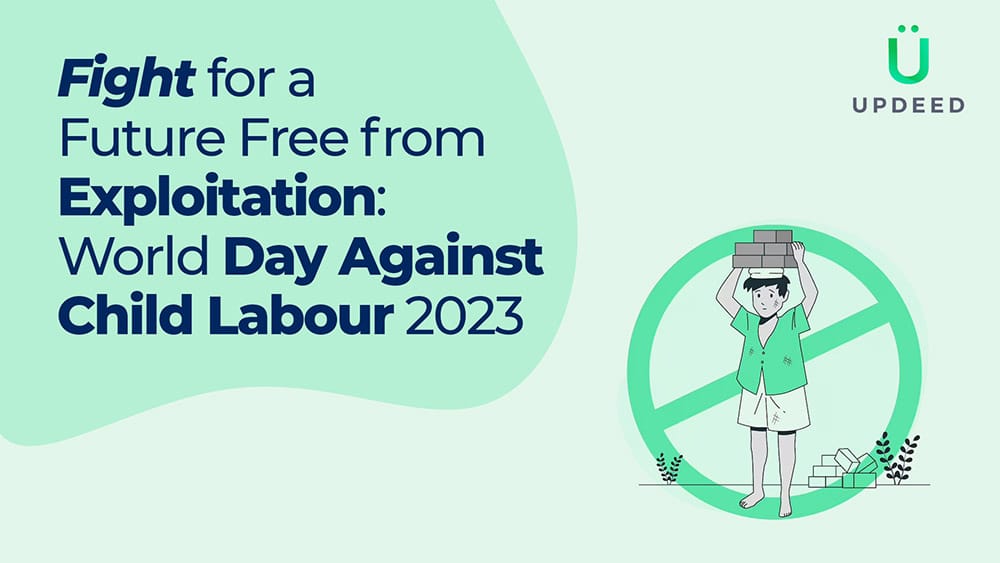Fight for a Future Free from Exploitation: World Day Against Child Labour 2023
Today marks World Day Against Child Labour, a significant annual event that raises awareness, fosters action and mobilises global efforts to eliminate child labour. This year’s commemoration carries even more weight as the world grapples with unprecedented challenges and strives to create a future where every child can thrive without exploitation.
This year’s World Day Against Child Labour theme is “Social Justice for All. End Child Labour!” This powerful theme highlights the intrinsic connection between social justice and eradicating child labour.
As we commemorate the 21st World Day Against Child Labour, it is imperative to reflect on the history and significance of this day.

Origin
The origins of World Day Against Child Labour can be traced back to the year 2000 when the International Labour Organization (ILO) first declared June 12th as a day to raise awareness about child labour and mobilise efforts to eliminate it.
Over the past two decades, significant progress has been made in reducing child labour worldwide. However, recent conflicts, crises, and the devastating impact of the COVID-19 pandemic have pushed more families into poverty, leaving millions of children vulnerable to exploitation and forcing them into the clutches of child labour.
Child labour, a phenomenon that robs children of their innocence and hampers their educational opportunities, remains a grave concern worldwide. The International Labour Organization (ILO) estimates that 160 million children are engaged in child labour, and nearly half are trapped in hazardous work that jeopardises their physical and mental well-being.
Why such a day matters
The World Day Against Child Labour serves as a crucial platform to underscore the urgent need to eliminate child labour in all its forms. It brings together governments, civil society organisations, trade unions, businesses, and individuals to share experiences, exchange ideas, and devise strategies to combat this persistent problem.
Across the globe, a plethora of events and initiatives are taking place to mark this significant day. Communities host educational programs, workshops, and exhibitions to raise awareness about child labour and its devastating consequences on children’s lives.
By engaging policymakers, businesses, and communities in dialogue, these events aim to ignite a collective commitment to creating an environment where children can grow, develop, and thrive without the burden of exploitation.
Governments are being called upon to strengthen legislation and enforcement mechanisms to protect children from labour exploitation on the international stage.
Robust legal frameworks play a vital role in deterring employers from engaging in child labour practices and ensuring the welfare and prospects of children. By implementing stringent laws and regulations, governments can send a clear message that child labour will not be tolerated, and those responsible will face severe consequences.
Efforts are also underway to improve access to quality education as a fundamental step towards eradicating child labour. Education empowers children and serves as a catalyst for breaking the cycle of poverty, opening doors to brighter futures.
Governments and international organisations are investing in educational infrastructure, teacher training, and awareness campaigns to promote the importance of education and encourage parents to prioritise sending their children to school rather than work. By making education accessible and inclusive, societies can create an environment where children can exercise their right to learn and grow.
Furthermore, the private sector increasingly recognises its role and responsibility in combating child labour. Businesses are urged to adopt responsible supply chain practices and conduct thorough due diligence to ensure no child labour is involved in producing and distributing their goods.
Through socially responsible practices, companies can contribute to eradicating child labour and fostering sustainable development. Consumers, too, play a pivotal role by supporting companies that uphold ethical labour standards and shunning those who exploit child labour.
Conclusion
Together, we can create a world where every child is free to pursue their dreams, receive an education, and enjoy the innocence and joys of childhood. Our collective responsibility is to ensure that children’s rights and well-being are protected, enabling them to contribute to a brighter and more equitable future for all.
Remember, every action counts. Let us act now and join the team UPDEED to end child labour and foster a world built on social justice and compassion.
Ready to make a positive impact in the world?
UPDEED is the place for you. Our free and open platform is filled with inspiring stories from individuals and organizations who are making a difference in their communities and beyond. Connect and collaborate with like-minded individuals from around the globe on UPDEED, and discover your own potential to create meaningful change. Join our community and make a difference.





